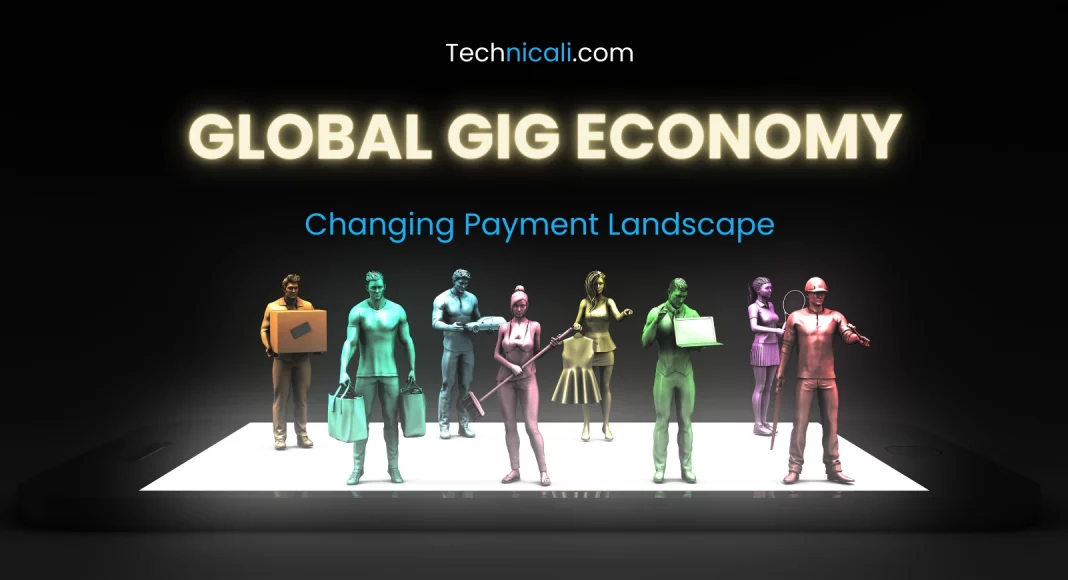The gig economy is a term that describes the growing trend of people working freelance or short-term contract jobs instead of full-time jobs. You can call it Side Hustle or Moonlighting.
This type of work has become more prevalent in recent years due to the rise of online platforms connecting businesses with freelancers, such as ridesharing app Uber, home-sharing platform Airbnb, and Online Work platforms like Fiverr.
The global gig economy is having a significant impact on the payments landscape. Traditional payment methods are challenged by new technologies, like UPI and Blockchain, better suited for gig workers.
Here’s a look at how the gig economy is changing payments and what this means for businesses in the future.
Contents
How the Gig Economy is Changing Payments

One of the most significant ways the gig economy changes payments is by making traditional payment methods, such as paper checks and bank account wire transfers, less prevalent. This is because gig workers are often paid through online platforms that offer their own built-in payment solutions, such as PayPal or Venmo.
The Advantages of Online Payment Platforms
- Convenience: One of the biggest advantages of online payment platforms is that they are very convenient. This is because they allow users to send and receive accurate payments quickly and easily without going through the hassle of using traditional payment methods.
- Security: Another advantage of online payment platforms is that they are typically very secure. They use advanced security features and online ledgers to protect users’ personal information and financial data.
- Speed: Online payment platforms like bitcoin, and UPI, allow users to transfer money instantly without having to wait for it to clear through the banking system.
The Disadvantages of Online Payment Platforms
- Fees: One downside of online payment platforms is that they often charge fees for their services. This can add up over time, especially if users make many transactions.
- Limited Functionality: Some users may be unable to do everything they want with them, such as sending money overseas(in the case of UPI) or making recurring payments.
- Unsupportive Customer Service: If something goes wrong with a transaction, it can be challenging to get help from customer service. Recently Paypal backlash for announcing 2500$ fine if found dispute cases without any genuine reason or calling it misinformation.
- Security Concerns: The Rise in the online payments industry is enormous. This raises concerns about the security of personal information. This is particularly true if the platform is not well-established or has had security issues in the past.
Over the past decade, online gig economies offer several benefits for workers and businesses. For workers, the main benefit is rapid growth and flexibility. Workers can choose the hours they want to work and which projects they want to take on. This flexibility can benefit parents who want to balance work with raising children.
For businesses, the main benefit of using online gig economies is cost savings. Businesses can save money on salaries, employee benefits, and office space by hiring freelance workers instead of full-time employment on demand. Additionally, companies can avoid paying taxes and other government fees associated with hiring full-time employees.
Another way the gig economy changes payments is by increasing the demand for mobile payment solutions. This is because many gig workers, such as Uber drivers, are paid through mobile apps that allow customers to make payments with their phones. As a result, businesses that want to attract gig workers need to have mobile-friendly payment solutions in place.
The gig economy is also changing the way businesses think about payments. In the past, businesses typically paid their employees monthly via direct deposit or paper check. However, in the gig economy, businesses need to be prepared to make real-time payments to pay gig workers as soon as they complete a job. This requires businesses to have access to fast, reliable payment solutions that can handle high volumes of transactions quickly and efficiently.
How do Gig Workers get paid?

Gig workers typically get paid through a third-party platform that connects them with customers. The platform takes a commission for each transaction. Payment methods vary depending on the platform, but most platforms accept major credit cards or PayPal. Some platforms also allow workers to be paid in cash.
Gig workers are typically paid per job or per hour. They may also be paid a flat rate for a project. Payment terms vary depending on the platform and the type of gig. For example, some platforms may allow workers to set their own prices, while others may have fixed prices for certain types of gigs.
Most gig platforms offer some level of protection for workers, such as dispute resolution services or insurance coverage. However, gig workers are not platform employees and are not covered by traditional employment laws. This means they do not have the same protections as employees, such as minimum wage laws or worker’s compensation. Gig workers also don’t usually get benefits such as health insurance or paid time off.
Before you start working as a gig worker, understand the platform’s terms and conditions. Make sure you know how you’ll be paid and what protections are in place. And remember that as a gig worker, you’re not an employee, so you don’t have the same rights and protections as employees.
What are the Challenges faced by the Gig Economy?

- Lack of job security, irregular wages, and uncertain employment status: Gig workers are often employed on a project-by-project basis with little job security. This can lead to irregular wages and uncertain employment status. For example, a gig worker may be hired to do a project for a company, but if the project is not completed successfully, the worker may not be hired again.
- Rising stress due to uncertainty associated with regularity in available work and income: Gig work is often unpredictable, leading to increased stress levels. Gig workers may not know when their next project will be or how much money they will earn. This can cause a great deal of instability and uncertainty in their lives.
- Limited access to the internet and digital technology: Many gig jobs require workers to access the internet and digital technology. However, gig workers often have different access to these technologies than traditional employees. This can make it difficult for them to complete the tasks assigned.
- Contractual relationship between the platform owner and gig worker denying the latter access to many workplace entitlements: Gig workers often have independent contractors, which denies them access to many workplace entitlements such as sick leave, holiday pay, and minimum wage. This can make it difficult for them to earn a living wage.
- Stress due to pressure from algorithmic management practices and performance evaluation based on ratings: Gig workers are often subject to algorithmic management practices and performance evaluation based on ratings. This can cause significant stress as they try to please the system to keep their jobs.
- Conflict between work and life due to the demands of gig work: Gig work often requires workers to be available all day and night. This can lead to conflict between work and life as workers try to balance their responsibilities.
- Insecurity about the future and lack of social protection: The gig economy is still in its early stages, and there is a lot of insecurity about the future. Gig workers often do not have access to social protection, such as unemployment benefits, which can make it difficult for them to weather tough times.
The Future of Payments in the Gig Economy

New technologies, such as UPI, cryptocurrency and multi-channel payment processing will likely shape it. These technologies are well-suited for gig workers because they offer fast, secure, and convenient payments. Additionally, these technologies are not currently subject to the same regulations as traditional payment methods, which gives businesses more flexibility in handling payments.
As the gig economy grows, businesses need to know how it changes payments. By understanding these changes, businesses can ensure they are using the best payment solutions for their needs and stay ahead of the curve.
The rise of the gig economy will change how businesses think about payments, which could have a ripple effect on other business areas in the future.


